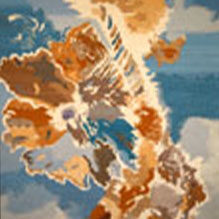Carlos Monsivais
Espanol:
¿Cómo alejarse de la deformación profesional que ante cualquier tema trae a cuento evocaciones literarias? En lo personal, tal distanciamiento me resulta imposible. Si contemplo pintura recuerdo de inmediato a Carlos Pellicer, a Virginia Woolf, a Katherine Mansfield, a Wallace Stevens, a Emily Dickinson, en cuyas obras importan tanto los estímulos sensoriales; cada instante de luminosidad es el paisaje en torno al cual se ordena el día, cada flor en el jardín es pequeña y mayúscula hazaña, y el jardín mismo se desenvuelve como exaltada conspiración de los sentidos, como ámbito perfecto para trocar la confesión en exclamación, donde los personajes conocen la embriaguez disciplinada y viven la lección mística a su manera, desde donde percibimos las semejanzas entre la hermosura vegetal y la gloria de la experiencia religiosa… “Reparado los lirios del campo, cómo crecen; no trabajan ni hilan; Mas os digo que ni aún Salomón con toda su gloria fue vestido así como uno de ellos”. La naturaleza sólo conoce una forma de permanencia: la repetición (Santayana), pero al ojo humano únicamente le es dado admirar la variedad infinita de sus formas.
English:
Shirley Chernitsky, or the Languages of Flowers How to get away from the occupational distortion which literary evocations tend to bring to any topic? For me personally, such distancing is impossible. If I contemplate Shirley’s painting I immediately think of Carlos Pellicer, Virginia Woolf, Katherine Mansfield, Wallace Stevens, Emily Dickinson, in whose works sensory stimuli are so important, every instant of luminosity is the landscape in relation to which the day is ordered; each flower in the garden is a small tremendous exploit, and the garden itself unfolds like an exalted conspiracy of the senses, like the perfect setting for changing confession into exclamation, where personalities meet disciplined inebriation, and experience the mystic lesson in their own way, from which we perceive the similarities between vegetable beauty and the glory of religious experience (“Behold the lilies of the field and how they grow: they work not, neither do they spin; yet Solomon in all his glory hath not more beautiful raiment.”) Nature knows only one kind of permanence: repetition (Santayana), but for the human eye only is it given to admire the infinite variety of her forms.
